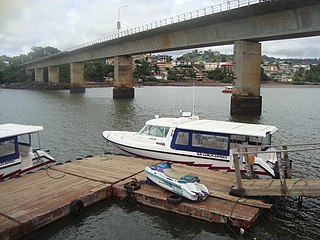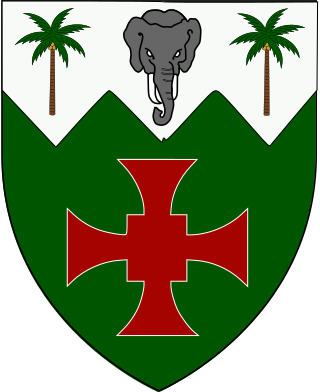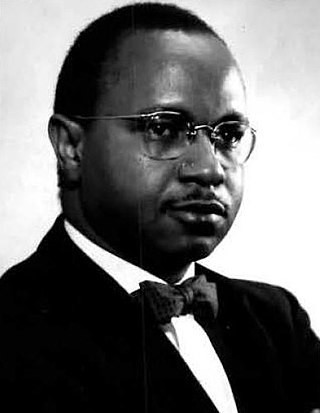Related Research Articles

Sierra Leone, officially the Republic of Sierra Leone, is a country on the southwest coast of West Africa. It shares its southeastern border with Liberia, and the northern half of the nation is surrounded by Guinea. Covering a total area of 71,740 km2 (27,699 sq mi), Sierra Leone has a tropical climate, with diverse environments ranging from savanna to rainforests. The country has a population of 7,092,113 as of the 2015 census. Freetown is the capital and largest city. The country is divided into five administrative regions, which are subdivided into 16 districts.
Sierra Leone first became inhabited by indigenous African peoples at least 2,500 years ago. The Limba were the first tribe known to inhabit Sierra Leone. The dense tropical rainforest partially isolated the region from other West African cultures, and it became a refuge for peoples escaping violence and jihads. Sierra Leone was named by Portuguese explorer Pedro de Sintra, who mapped the region in 1462. The Freetown estuary provided a good natural harbour for ships to shelter and replenish drinking water, and gained more international attention as coastal and trans-Atlantic trade supplanted trans-Saharan trade.

Freetown is the capital and largest city of Sierra Leone. It is a major port city on the Atlantic Ocean and is located in the Western Area of the country. Freetown is Sierra Leone's major urban, economic, financial, cultural, educational and political centre, as it is the seat of the Government of Sierra Leone. The population of Freetown was 1,055,964 at the 2015 census.

Fourah Bay College is a public university in the neighbourhood of Mount Aureol in Freetown, Sierra Leone. Founded on 18 February 1827, it is the first western-style university built in Sub-Saharan Africa and, furthermore, the first university-level institution in Africa. It is a constituent college of the University of Sierra Leone (USL) and was formerly affiliated with Durham University (1876–1967).
Waterloo is a city in the Western Area of Sierra Leone and the capital of the Western Area Rural District, which is one of the sixteen districts of Sierra Leone. Waterloo is located about twenty miles east of Freetown. Waterloo is the second largest city in the Western Area region of Sierra Leone, after Freetown. The city had a population of 34,079 in the 2004 census, and 55,000 as per a 2015 estimate. Waterloo is part of the Freetown metropolitan area.
Herbert Christian Bankole-Bright was a well-known political activist in Sierra Leone.

St. George's Cathedral is an historical Church Mission Society Anglican church in Freetown, Sierra Leone. The church was one of the grandest churches in Freetown, and had one of the highest attendance ratings for a church. It is now the Cathedral Church of the Anglican Diocese of Freetown. As an iconic edifice strongly associated with the Creole people of Sierra Leone, St George's Cathedral was described as "that bastion of Creoledom."
Dr. John Augustus Abayomi-Cole (1848–1943) was a Sierra Leonean medical doctor and herbalist.

The Supreme Court of Sierra Leone is the highest court in Sierra Leone. It has final jurisdiction in all civil, criminal, and constitutional cases within Sierra Leone, and its decisions cannot be appealed. The Supreme Court has the exclusive constitutional power to overturn ruling of lower courts within the jurisdiction of Sierra Leone. The Supreme Court, along with the Court of Appeals, High Court of Justice, and magistrate courts form the Judicial branch of the Government of Sierra Leone.

Sierra Leone, officially the Republic of Sierra Leone, is a Constitutional Republic in West Africa. Since it was founded in 1792, the women in Sierra Leone have been a major influence in the political and economic development of the nation.
The following is a timeline of the history of the city of Freetown, Sierra Leone.
Freetown City Council is the municipal government of the city of Freetown, the capital of Sierra Leone. It was established in 1893 and is one of the oldest municipal governments in Africa. The Freetown City Hall, located on Wallace-Johnson Street, is the meeting place and seat of government of the Freetown City Council.

The Sierra Leone Creole people are an ethnic group of Sierra Leone. The Sierra Leone Creole people are descendants of freed African-American, Afro-Caribbean, and Liberated African slaves who settled in the Western Area of Sierra Leone between 1787 and about 1885. The colony was established by the British, supported by abolitionists, under the Sierra Leone Company as a place for freedmen. The settlers called their new settlement Freetown. Today, the Sierra Leone Creoles are 1.2 percent of the population of Sierra Leone.

Arthur Thomas Daniel Porter III was a Creole professor, historian, and author. His book on the Sierra Leone Creole people, Creoledom: A study of the development of Freetown society, examines their society in a way in which few books of their time period had, and it is one of the most quoted books on the Creoles. He was published in East Africa and the UK.

General elections were held in Sierra Leone Colony and Protectorate for the first time on 28 October 1924. The National Congress of British West Africa won all three seats.
Sir Alexander Ransford Slater was a British colonial administrator, who served as governor of Sierra Leone, the Gold Coast and Jamaica.
George Gurney Mather Nicol (1856-1888) was a Sierra Leonean clergyman. He was the first African from a British colony to be educated at Cambridge University.

Sierra Leonean nationality law is regulated by the Constitution of Sierra Leone, as amended; the Citizenship Act, and its revisions; and various international agreements to which the country is a signatory. These laws determine who is, or is eligible to be, a national of Sierra Leone. The legal means to acquire nationality, formal legal membership in a nation, differ from the domestic relationship of rights and obligations between a national and the nation, known as citizenship. Nationality describes the relationship of an individual to the state under international law, whereas citizenship is the domestic relationship of an individual within the nation. In Britain and thus the Commonwealth of Nations, though the terms are often used synonymously outside of law, they are governed by different statutes and regulated by different authorities. Sierra Leonean nationality is based on descent from a person who is Negro-African, regardless of whether they were born in Sierra Leone, jus soli, or abroad to a Sierra Leonean, jus sanguinis. The Negro clause was inserted based upon the founding of the colony as a refuge for former slaves to prevent economically powerful communities from obtaining political power. It can be granted to persons with an affiliation to the country, or to a permanent resident who has lived in the country for a given period of time through naturalisation.
Samuel Benjamin (Akube) Thomas, was a Sierra Leonean entrepreneur and philanthropist who amassed a large fortune from which he left a substantial endowment for the establishment of an agricultural college.
References
- ↑ "Prof. Akintola Wyse Replaced", Standard Times (Sierra Leone), November 15, 2002.
- ↑ "Vice-President Solomon Berewa today attended the funeral service of Prof Akintola Wyse, who until his death, was chairman of the Public Service Commission", SLBS Radio, Freetown, October 18, 2002.
- ↑ "Prof. Akintola Wyse (RIP)" (PDF), INASLA Newsletter, International Association of Sierra Leoneans Abroad, 4: 8, October 2002, archived from the original (PDF) on 2008-09-08.